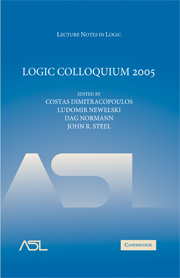Book contents
- Frontmatter
- Contents
- Introduction
- Speakers and Titles
- Thread algebra and risk assessment services
- Covering definable manifolds by open definable subsets
- Isomorphisms and definable relations on computable models
- Independence for types in algebraically closed valued fields
- Simple groups of finite Morley rank
- Towards a logic of type-free modality and truth
- Structural analysis of Aronszajn trees
- Proof analysis in non-classical logics
- Paul Bernays' later philosophy of mathematics
- Proofnets for S5: Sequents and circuits for modal logic
- Recursion on the partial continuous functionals
- A transactional approach to the logic of truth
- On some problems in computable topology
- Monotone inductive definitions and consistency of New Foundations
- LECTURE NOTES IN LOGIC
Recursion on the partial continuous functionals
Published online by Cambridge University Press: 18 December 2009
- Frontmatter
- Contents
- Introduction
- Speakers and Titles
- Thread algebra and risk assessment services
- Covering definable manifolds by open definable subsets
- Isomorphisms and definable relations on computable models
- Independence for types in algebraically closed valued fields
- Simple groups of finite Morley rank
- Towards a logic of type-free modality and truth
- Structural analysis of Aronszajn trees
- Proof analysis in non-classical logics
- Paul Bernays' later philosophy of mathematics
- Proofnets for S5: Sequents and circuits for modal logic
- Recursion on the partial continuous functionals
- A transactional approach to the logic of truth
- On some problems in computable topology
- Monotone inductive definitions and consistency of New Foundations
- LECTURE NOTES IN LOGIC
Summary
Introduction. We describe a constructive theory of computable functionals, based on the partial continuous functionals as their intendend domain. Such a task had long ago been started by Dana Scott [30], under the well-known abbreviation LCF. However, the prime example of such a theory, Per Martin-Löf's type theory [23] in its present form deals with total (structural recursive) functionals only. An early attempt of Martin-Löf [24] to give a domain theoretic interpretation of his type theory has not even been published, probably because it was felt that a more general approach — such as formal topology [13] — would be more appropriate.
Here we try to make a fresh start, and do full justice to the fundamental notion of computability in finite types, with the partial continuous functionals as underlying domains. The total ones then appear as a dense subset [20, 15, 7, 31, 27, 21], and seem to be best treated in this way.
Information
- Type
- Chapter
- Information
- Logic Colloquium 2005 , pp. 173 - 201Publisher: Cambridge University PressPrint publication year: 2007
Accessibility standard: Unknown
Why this information is here
This section outlines the accessibility features of this content - including support for screen readers, full keyboard navigation and high-contrast display options. This may not be relevant for you.Accessibility Information
- 2
- Cited by
